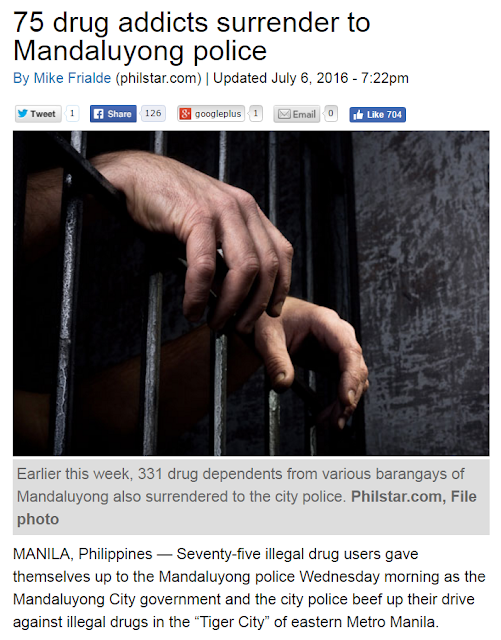Prisons or Schools
Eighteen were killed in the Philippines over the past weekend. They were supposedly suspected drug pushers. In a couple of days, nearly a thousand drug users and pushers had surrendered perhaps in fear of getting killed. From one community alone the Philippine Star reported seventy five drug users surrendering to the police.
Thus, with thousands of drug users giving themselves up, the needs for prisons are sure to increase. In the United States, the Washington Post reports that states have been increasing their spending on prisons at a faster rate than on education.
With the rate of drug users and pushers surrendering in the Philippines, it will just be a matter of time before prisons see the same overcrowding classrooms in public schools in the Philippines are known for.
The new president of the Philippines, Duterte, of course, did not fail to cite that funeral parlors might also find the current situation in the Philippines quite lucrative. RT recently quoted Duterte:
Six years ago, Diane Ravitch wrote the book The Death and Life of the Great American School System. In page 298 of this book, Ravitch reminded us of words from W. E. B. Du Bois:
We need to remind ourselves of Nesbit's article last last year US News:
And here is a video worth watching.
 |
| Above copied from the Philippine Star |
 |
| Above copied from the Washington Post |
The new president of the Philippines, Duterte, of course, did not fail to cite that funeral parlors might also find the current situation in the Philippines quite lucrative. RT recently quoted Duterte:
"If you know of any addicts, go ahead and kill them yourself as getting their parents to do it would be too painful," he added.
Setting up funeral parlors would help earn some money, Duterte noted.
"I assure you [that] you won't go bankrupt. If your business slows I will tell the police, 'Do it faster to help the people earn money.'"In a previous post on this blog, DepEd Plans to Teach Students How to Spot Illicit Drug Pushers, students as early fourth grade are going to be introduced to a drug literacy program. If only schools are just asked to do what they are supposed to do but it seems that every problem is thrown at schools.
Six years ago, Diane Ravitch wrote the book The Death and Life of the Great American School System. In page 298 of this book, Ravitch reminded us of words from W. E. B. Du Bois:
This is what I have learned after many decades of studying American education: education is a reflection of society. Education is integrally related to the society in which it is embedded. It is intended to improve society by improving the knowledge and skills of the people, but it works incrementally over years, not overnight. The public schools have been one of the primary instrumentalities of American democracy, disseminating knowledge and skills widely and making social mobility possible.
But schools cannot by themselves solve the problems of poverty and inequality. As W. E. B. Du Bois said in 1935, speaking to an audience of African American teachers in Georgia, the only way schools can improve society is to make men more intelligent by teaching them academic skills. If they fail to do that, he warned, the schools will fail in all other functions, “because no school as such can organise industry, or settle the matter of wage and income, can found homes or furnish parents, can establish justice or make a civilised world.”The ills of education in the Philippines are obviously reflections of the society's ills. And so is drug abuse. No school nor prison "can organize industry, or settle matter of wage and income, can found homes or furnish parents, can establish justice or make a civilised world."
We need to remind ourselves of Nesbit's article last last year US News:
And here is a video worth watching.

Comments
Post a Comment